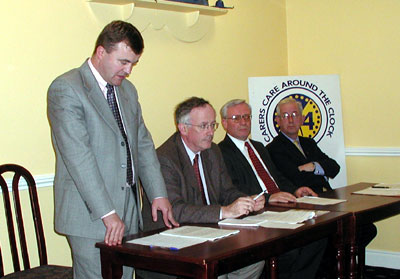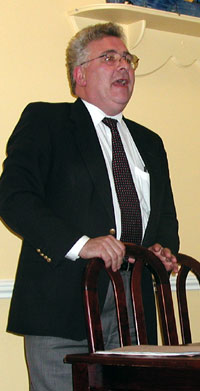Kildare carers tackle politicians

Deputy Sean Power, senator John Dardis, chairman of the carer's meeting John Farrell, and deputy Emmet Stagg.
KILDARE GENERAL, 2 May 2002: by Trish Whelan. Angry carers from all over Kildare have told politicians the time for talk was over and they now wanted proper recognition for the work they do.
Politicians who turned up to a recent meeting organised by Naas Carer’s Association were told carers are saving the state millions by looking after their loved ones at home. Politicians in attendance included Deputy Emmet Stagg TD, Sean Power FF, Deputy Bernard Durkan TD, Senator John Dardis. Finance Minister Charlie McCreevy and Deputy Alan Dukes TD had apologised as they had prior engagements.
All heard very vocal complaints on ‘lack of action’ on the issue down the years.
One woman shouted she felt she was ‘banging her head against a wall’. “We’re saving the state a fortune and we all work bloody hard,” she said. Another said they ‘should be embarassed to sit up there’. “It’s time you got off your backsides and did something for us.”
One carer said she didn’t receive any funding for looking after her husband for the past seven years. Another said the carer’s allowance should not be from Social Welfare but should be ‘an honest payment for a job well done’.
Another woman had cared for disabled family members for 30 years without any recognition for a ‘lifetime of grief’. A son is awaiting a transplant in England where that state would look after her while she was there. “I’m recognised there as a carer, but not in my home country. I’ve no stamps and won’t get a pension,” she added. “Maybe we should all go to England, because nobody seems to care here.”
Chairman John Farrell said carers should not be just paid a social welfare allowance but there should be a payment for a job of work. He pointed out that there are almost 400 people on their books with ‘one story worse than the other’.
“None of us set out to be a carer,” he said. “It can happen to your overnight as a result of an accident, heart attack or a stroke. There’s no apprenticeship to becoming a carer.”
Deputy Emmet Stagg acknowledged the work of the carers and apologised on behalf of the Labour Party for the lack of action down the years. “I take my share of responsibility for the neglect of carers and ignorance of what you are doing,” he told them.
If in power after the general election he pledged publically that his party would immediately abolish the means test for the carer’s allowance and provide a payment linked to the average industrial wage. “It should be seen as a payment for a 24-hour job of work,” he said.
The party also proposes to establish a national carers commission and to extend free GP care to all citizens. Party policy, he added, also includes a home help support system, and a doubling of the number of respite care beds as well as amending the Constitution to copperfasten the rights of all carers and to establish a carers ombudsman.
He said the Labour Party would not go into any government unless there is a pledge to implement this policy. He said the country would ‘well afford to do this’.
For FF, Deputy Sean Power agreed the current scheme is in need of ‘a radical overhaul’. He said from listening to true lives stories it was difficult for him to defend the situation that has prevented carers from getting a fair crack of the whip. He promised to work on their behalf within his party to ensure changes are made. He told the meeting that the FF policy document would be published when the general election was called. But he would be against abolishing the means test.
Angry at hearing this, one lady shouted: “You had an opportunity to do something. I’m not saying thank you for the eight euros a week increase. I’m saying I should be getting paid as in a normal job.” She resented being made ‘a charity payment’ by the Finance Minister saying ‘we don’t count because we don’t have a wage and that’s why you don’t have a policy on carers’. “You don’t honestly care,” she stormed.
“You have made a huge distinction between the haves and have nots and carers fall mostly into the ‘have nots’. Get up off your backsides and do something for those who don’t have a voice. There are many people that don’t have anybody to fight for them and you just don’t care!”
Deputy Power said he resented that. “I wouldn’t be interested if I didn’t come here tonight. Anyone who thinks I don’t care, don’t vote for me” he replied.
He told how the budget increase in the carers allowance cost 179m euros in one year.
“The amount we get is an insult for carers,” came back from the floor.
One woman told how she has looked after her disabled husband for seven years without getting any funding. A man compared the carer’s allowance to the 1800 euros it costs the state to keep a prisoner in Mountjoy.
“People don’t follow political groups any more. They follow causes,” another person added. “There would be a lot of goodwill in Kildare if somewould would do something about it.”
“I care,” stated Senator John Dardis who has attended carers meetings for the past 12 years. He said the question is what will we do about it. He said the party’s manifesto would be made public the following week. He believed bureaucracy is suffocating everybody and the system is so inflexible.
He said it should be possible for someone to go out to a carer and assess needs and there should be an appeals procedure where there is a dispute. He accepted that in government not enough has been done. To abolish the means test, he said, would cost 300m euros but the resources are there to do it.
 Last to speak was Deputy Bernard Durkan (left), a previous spokesman on Health. He criticised the lack of places to care for young chronically ill people and said it should only require one single phone call to activate the services to the right person in the Health Board. But he added that this was not the case now.
Last to speak was Deputy Bernard Durkan (left), a previous spokesman on Health. He criticised the lack of places to care for young chronically ill people and said it should only require one single phone call to activate the services to the right person in the Health Board. But he added that this was not the case now.
He hoped FG would have procedures in place to ‘humanise’ the whole procedure. He said the voluntary effort in caring is appreciated but ‘often greatly abused’ with too much responsibility being put on carers. He told how he has suffered frustration in dealing with the system. He said FG proposes to liberalise the carers allowance and it will be ‘an improvement’ on the present situation.
Over 30,000 people nationally are being paid the carer’s allowance. He said recognition should be given to the fact that carers at home make a bed available in an institution for somebody else and that as the population grows and people live longer, the demand for places of a specialised nature will rise.
He pledged to help many of the hardship problems encountered by some of the carers at the meeting.
John Farrell told the politicians: “The day of talking is over. We need action now.” He praised such a big turn out of carers saying ‘it’s great to see so many people behind us for what we are trying to do.” He hoped the meeting wasn’t just a ‘talk shop’ and that action will come from it.
©2002knn

